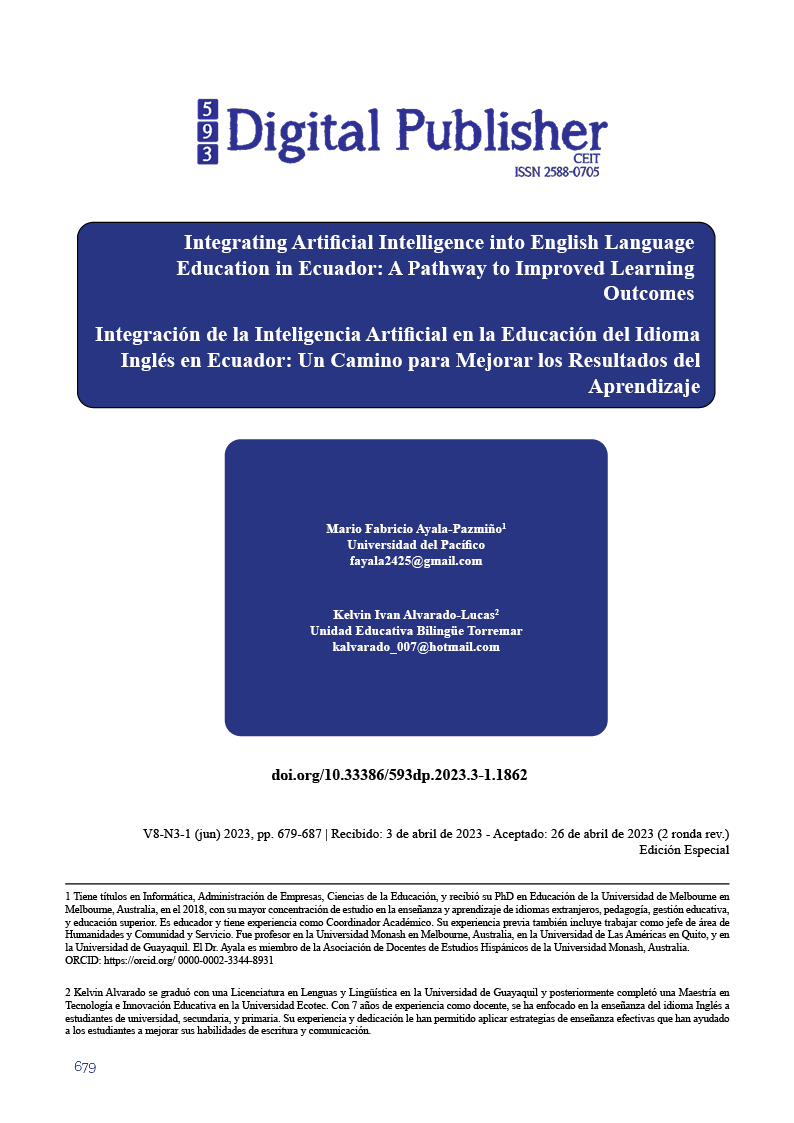Integrating Artificial Intelligence into English Language Education in Ecuador: A Pathway to Improved Learning Outcomes
Main Article Content
Abstract
Artificial Intelligence (AI) can potentially enhance language learning outcomes by offering personalized learning experiences, improving speaking and listening skills, and increasing student engagement. However, integrating AI into language education in countries like Ecuador presents unique challenges, such as limited infrastructure, teacher training, and data privacy and security concerns. This study explores the potential benefits and challenges of integrating AI into English language education in Ecuador through a qualitative approach. Five English teachers from the best five schools in Quito were purposively sampled and interviewed using semi-structured questions. Thematic analysis was used to analyze the data, and the findings reveal that adequate infrastructure and teacher training are necessary to integrate AI effectively into English language education. The potential benefits of integrating AI include personalized feedback, improved language proficiency, and objective assessments. However, there are concerns about the potential negative impact of AI on human interaction and emotional support for students. Further research is needed to explore these issues in more depth. In addition, the practical and ethical integration of AI in language education requires the development of infrastructure, teacher training, and privacy policies.
Downloads
Article Details

This work is licensed under a Creative Commons Attribution-NonCommercial-ShareAlike 4.0 International License.
1. Derechos de autor
Las obras que se publican en 593 Digital Publisher CEIT están sujetas a los siguientes términos:
1.1. 593 Digital Publisher CEIT, conserva los derechos patrimoniales (copyright) de las obras publicadas, favorece y permite la reutilización de las mismas bajo la licencia Licencia Creative Commons 4.0 de Reconocimiento-NoComercial-CompartirIgual 4.0, por lo cual se pueden copiar, usar, difundir, transmitir y exponer públicamente, siempre que:
1.1.a. Se cite la autoría y fuente original de su publicación (revista, editorial, URL).
1.1.b. No se usen para fines comerciales u onerosos.
1.1.c. Se mencione la existencia y especificaciones de esta licencia de uso.
References
Bi, J., Liang, Y., Dong, W., Lin, H., & Li, J. (2018). Learning to personalize vocabulary learning: A hybrid approach for adaptive vocabulary learning through a mobile application. Computers & Education, 125, 299-314. doi: 10.1016/j.compedu.2018.06.012.
Braun, V., & Clarke, V. (2006). Using thematic analysis in psychology. Qualitative research in psychology, 3(2), 77-101.
Chen, C., Wang, C., & Li, H. (2019). AI-based language learning: Opportunities and challenges. International Journal of Emerging Technologies in Learning, 14(2), 4-18. https://online-journals.org/index.php/i-jet/article/view/10355/6201
wasaki, S., Nakabayashi, K., & Yamashita, M. (2019). Intelligent Computer-Assisted Language Learning: The Future of L2 Learning or Simply a Supplementary Tool? Journal of Educational Technology Development and Exchange, 12(1), 1-18.
Li, C., Zhao, Y., & Wang, X. (2020). Teachers' perceptions and practices of implementing artificial intelligence in teaching English speaking and listening skills: A case study in China. International Journal of Emerging Technologies in Learning, 15(14), 170-186. https://doi.org/10.3991/ijet.v15i14.12466
Li, L., Ma, Q., & Xu, Q. (2018). A study on the application of artificial intelligence in English listening and speaking teaching. In 3rd International Conference on Education, Management and Social Science (ICEMSS 2018) (pp. 222-225). Atlantis Press.
Lu, Y., & Wang, X. (2019). Impact of Artificial Intelligence on English Learning: An Empirical Study. Journal of Educational Technology Development and Exchange, 12(1), 1-12.
Manzo, C., & Pérez-Sabater, C. (2021). AI in English language education in Colombia: Challenges and opportunities. Technology, Pedagogy and Education, 30(2), 149-163. doi: 10.1080/1475939X.2020.1868508
OECD (2015). Students, computers and learning: Making the connection. OECD Publishing. https://doi.org/10.1787/9789264239555-en
Razzaq, L., Heffernan, N. T., & Aleven, V. (2019). Artificial intelligence in education. In The Cambridge Handbook of Artificial Intelligence (pp. 945-968). Cambridge University Press.
Zawacki-Richter, O., & Naidu, S. (2016). Mapping research trends from 35 years of publications in Computers & Education. Computers & Education, 98, 42-58.
Zheng, T., Liu, R., Liu, J., & Wang, X. (2020). Privacy protection of student data in the era of artificial intelligence. Journal of Educational Technology Development and Exchange, 13(1), 1-14.
Zhu, W., Zhang, Y., Li, J., & Li, M. (2020). A preliminary study on the implementation of artificial intelligence in English education in China: Opportunities and challenges. Education and Information Technologies, 25(6), 5703-5716.



